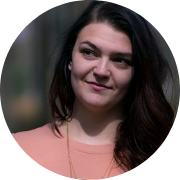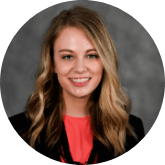
While many people associate project management with industries like construction and information technology, it is actually used in almost every industry–including design. Former PMP Exam Prep student Kayla Brown uses her project management knowledge while serving as the project manager for Simple Focus, a design agency. I recently sat down with Kayla to hear about how she is implementing PMP practices to create smoother experiences for her organization and clients.
Marah: How did you begin your career in project management?
Kayla: I went to UTC to study graphic design. Immediately after finishing undergrad, I took a position at a startup as a creative director. Within that role, I had my first experience with managing a team. After working as a state programs manager for Million Women Mentors, I landed at my current company, Simple Focus. I am the only project manager, which sounds overwhelming, but my design background has helped me gain greater understanding in learning the role. It’s exactly where I want to be!
M: Why did you pursue the PMP certification?
K: From a business perspective, it made a lot of sense. Many of our clients ask what certifications our team members have. The most well-known project management certification is the PMP, and having it is an asset to our organization. On a personal level, I knew it would boost my confidence within my role. I have more knowledge, and we have more structure in our approach to projects. I can say to myself, “I know that I know what I am doing.”
M: Why did you choose to pursue certification prep at UTC?
K: At the beginning of 2020, every team member at my company sat down and wrote out their goals for the year. My biggest goal was becoming PMP certified. It was my responsibility to research how I went about doing that. I knew that a prep course would be majorly beneficial, so I sat down to look at different course options. I immediately looked to see if UTC offered a PMP prep course. As an alumni, I know the excellent quality of the education UTC offers. I trust UTC.
M: What kind of projects do you work on at Simple Focus? What did you learn in the PMP course that is beneficial to you on a daily basis?
K: There’s a lot of variety in our space with the range of projects we work on. On one side, we help companies rebrand. On the other side, we are building apps and conducting user experience research. We have a large variety of projects and always have to be flexible in our approach. However, regardless of the type of project, there are processes I use repeatedly, like finding the scope, determining the budget, developing the schedule, managing the project team, and closing the project. While studying for the PMP, the processes seem complex, but they fit together and you do many of them at the same time. The real-life application helped me realize that PMP processes are not as overwhelming as I originally thought!
M: What are other benefits you found to taking the PMP course versus trying to prepare on your own?
K: First, Ginger Duggan’s help with the application process was extremely beneficial. She answered the millions of questions I had and ensured that every piece of the application was put together correctly. I also submitted my application after the course, which I thought was helpful because I was able to use the lingo I learned from the course on the application. The instructor asked great questions to help us comprehend and critically think about the content. It was also nice to have a week that was a dedicated time and space to focus on preparing for the PMP. I would definitely recommend the course to anyone considering taking the PMP exam!
M: What advice would you give to someone studying for the PMP? What are some study tips/takeaways you implemented?
K: Take the course and really pay attention to what you are learning. Immerse yourself in PMP! Then, if you have limited time while studying after the course, focus your time on understanding the processes, along with their inputs, tools and techniques, and outputs. Be able to apply the processes to real-world examples! Having an in-depth understanding of the processes and how they functioned within knowledge areas and process groups helped me pass my exam. (Also, flash cards were my best friends).
M: What’s next now that you are PMP certified?
K: I want to continue figuring out how to apply PMP processes within Simple Focus more effectively. Applying every aspect of PMP doesn’t happen overnight, but I am excited to see how we continue to improve our project management flow over the next year!
ABOUT THE AUTHOR:

Marah Whitaker (think Laura with an M) serves as the marketing assistant for the UTC Center for Professional Education. During the workday, she spends time writing blog posts, creating content for social media, developing email campaigns, and building relationships with CPE’s customer base. During her free time, you can find her getting lost in a good book, having spontaneous dance parties, playing piano, and going to Buffalo Wild Wings on Wing Night. Professionally and personally, she aspires to live by Mr. Feeny’s advice, “Dream. Believe. Try. Do Good.” She strives to use her passions to serve others and contribute positively to the world around her.
Connect with Marah on LinkedIn.